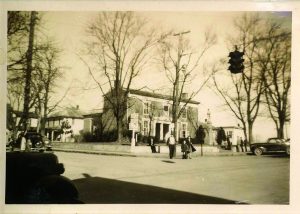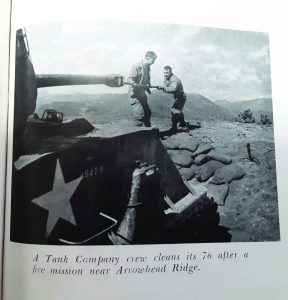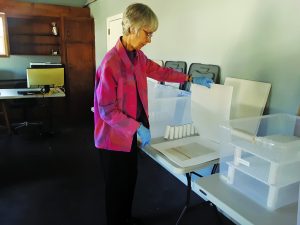
The Floyd County Historical Society has big plans for 2020: the Floyd County Historical Society 2020 Exhibit, and the ambitious Courthouse Document Conservation Project
In 2019, while the Historical Society Museum featured an exhibit on the history of Floyd County churches, volunteers worked to prepare for the conservation of thousands of documents once stored in the basement of the Floyd County Courthouse.
 This year, the 2020 Featured Exhibit, “Wars Hot and Cold, Floyd County 1945-1960,” will look at Floyd County during the fifteen-year period from the end of the Second World War through to the end of the Eisenhower Administration (1945-1960). Among the topics displayed at the museum will be the return of the troops from World War II, as well as service and the county in the immediate aftermath of the war. There will also be displays focusing on the beginnings of the Cold War. These will include a look at the Korean Conflict and the soldiers who served in Korea. There will also be a look at the dynamics of Floyd County in the Fifties.
This year, the 2020 Featured Exhibit, “Wars Hot and Cold, Floyd County 1945-1960,” will look at Floyd County during the fifteen-year period from the end of the Second World War through to the end of the Eisenhower Administration (1945-1960). Among the topics displayed at the museum will be the return of the troops from World War II, as well as service and the county in the immediate aftermath of the war. There will also be displays focusing on the beginnings of the Cold War. These will include a look at the Korean Conflict and the soldiers who served in Korea. There will also be a look at the dynamics of Floyd County in the Fifties.
Floyd County had a vibrant economy in the post-war years. Returning soldiers pushed for school improvements, increased economic opportunities, and recreational and cultural enhancements. The County also faced the challenge of serving all its citizens in the age of the Civil Rights movement. Early momentum for change led to several educational, cultural, and economic improvements. Growth, however, slowed during the period. The county’s population began to decrease and many of the early successes could not be sustained.
 While visiting the Historical Society Museum, the curious might also learn about the Courthouse Document Conservation Project which is currently in the works. These documents accumulated in the old Floyd County Courthouse for almost a hundred years; from the formation of Floyd County in 1831 until 1906. In the years since, they have been collecting dust in the basement of the current Floyd County Courthouse.
While visiting the Historical Society Museum, the curious might also learn about the Courthouse Document Conservation Project which is currently in the works. These documents accumulated in the old Floyd County Courthouse for almost a hundred years; from the formation of Floyd County in 1831 until 1906. In the years since, they have been collecting dust in the basement of the current Floyd County Courthouse.
Among these two-hundred-year-old documents are judiciary records, criminal records, deeds, land tax filings, and so much more. Most of these are folded like brochures and then bundled and tied together. Many with multiple pages were also paper clipped, stapled, or sewn together like small booklets then stored tightly in boxes. As a result, the papers they were made from have become brittle and difficult to handle. The process of opening these fragile documents and digitizing their contents has become a focal project for the Historical Society.
Each one will be undergoing a humidification, digitization, and preservation process that has been painstakingly researched and tested at the Historical Society since July of 2019. The process includes the use of large storage bins with distilled water in the bottom and shelving to support the documents above the water. Four-inch long sections of PVC pipe support sections of light-diffusing panels to create the shelving. When bundles of documents are placed on the shelving within the bins and the lids secured, they gently absorb the moisture necessary for the sharp folds in the papers to relax. Each set of documents needs four to twelve hours of humidification before they can be partially unfolded. They need additional time, usually overnight, to finish relaxing the paper. Once the paper is supple enough to unfold completely, it can then be laid between sheets of absorbent blotting paper to dry and be pressed completely flat under a weight.
Once they are completely dried and pressed, they still must be scanned so that a digital record can be created. And finally, each document will be placed within its own protective sleeve and re-catalogued for long term preservation.
It is estimated that this trove contains over 40,000 documents. In order to complete the conservation of this massive collection within the current century, the Historical Society has rented a temporary annex and put together twenty-two humidification boxes to help speed up the process. Even with this added capacity, volunteers estimate that it will take over six years to complete the project, provided there is a constant flow of volunteers to keep the documents moving through the que.
 Please feel free to contact the Floyd County Historical Society to find out more about this and other projects adopted by the organization. Also, stop by to visit the Museum and see the 2020 Featured Exhibit. The new exhibit opens Saturday April 18th, 2020.
Please feel free to contact the Floyd County Historical Society to find out more about this and other projects adopted by the organization. Also, stop by to visit the Museum and see the 2020 Featured Exhibit. The new exhibit opens Saturday April 18th, 2020.
Museum hours are Thursday and Friday from 12:00pm to 4:00pm and Saturdays from 11:00am to 3:00pm. There is wheelchair access to the first floor and admission is free to all.
Floyd County Historical Society
(540) 745-3247
info@floydhistoricalsociety.org
www.floydhistoricalsociety.org
